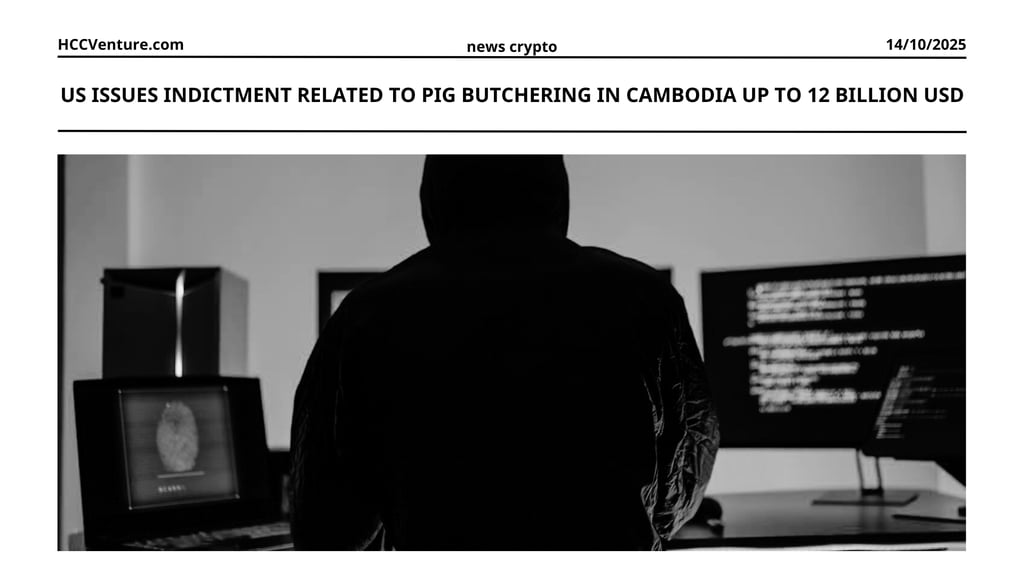US indicts Pig Butchering in Cambodia for up to $12 billion
The Department of Justice has announced an indictment seeking the seizure of more than $12 billion in Bitcoin linked to a large-scale fraud operation allegedly run by Chinese nationals at a complex in Sihanoukville, Cambodia.
10/14/20252 min read


Announcement of indictment
The 45-count indictment, unsealed Monday by the Southern District of New York, charges Li and 18 co-defendants with wire fraud, money laundering and RICO violations, painting a portrait of a transnational organization that defrauded more than 50,000 victims — mostly elderly Americans — through romance scams and fake investment apps, raking in a total of $15 billion since 2023.
As BTC stabilizes above $116,500 amid the fallout, the investigation not only highlights Cambodia’s status as a scam haven, but could also unlock the largest cryptocurrency seizure ever, rivaling the $3.6 billion Silk Road seizure. With the Treasury Department eyeing sanctions against those facilitating Cambodia, the case highlights the double-edged sword of crypto: Borderless innovation meets borderless crime, putting pressure on exchanges to beef up KYC and threatening $1 trillion in illicit flows.
It is the largest cryptocurrency forfeiture request in U.S. legal history, underscoring both the growing global scale of digital fraud and Washington’s expanding reach in pursuing cross-border cybercrime activities.
The "Pig Butchering" Phenomenon
The term "Pig Butchering" — derived from the Chinese phrase "shā zhū pán" (杀猪盘) — refers to a long-running social engineering scam in which victims are "fattened" through emotional manipulation and fake investment opportunities before their money is siphoned off to fraudulent cryptocurrency platforms.
The US Department of Justice alleges that the Cambodia-based operation operated as a sophisticated combination of romance scam, cryptocurrency Ponzi scheme, and money laundering, leveraging both social media and cryptocurrency infrastructure to target tens of thousands of victims worldwide.
The scam is said to have taken place on Telegram, WhatsApp and dating apps, often posing as financial advisors or lovers.
Victims are led to fake investment dashboards that mimic legitimate exchanges and show fake returns.
Once the funds are deposited, they are passed through mixers, cross-chain bridges, and secret token swaps to conceal their origin.
According to blockchain forensics, the total proceeds exceeded $12 billion in BTC distributed across hundreds of wallets and custodial accounts linked to the network.
A warning to the legal profession
If successful, the $12 billion Bitcoin seizure would surpass all previous US crypto asset seizures — including those of Silk Road (69,000 BTC) and Bitfinex (94,000 BTC) — and would be a landmark in crypto law enforcement precedent.
The operation continues to expose the emerging cybercrime nexus in Cambodia, Laos and Myanmar, where poorly regulated industrial zones have become bases for cryptocurrency fraud, human trafficking and scam syndicates. The indictment could increase international pressure on regional governments to strengthen digital crime enforcement and cross-border cooperation against money laundering.
The scale of this case reflects a new strategic approach by the U.S. government—treating large-scale cryptocurrency scams as financial terrorism, not as individual scams. Both the Justice Department and the Treasury Department have prioritized tracking and freezing illicit cryptocurrency flows linked to human exploitation, cybercrime, and state-linked networks.
Justice Department documents show that some of the laundered Bitcoin was moved through mainstream and over-the-counter exchanges, prompting increased scrutiny of KYC/AML practices. Exchanges that unwittingly processed the transactions involved could face civil penalties or enforcement action.
Disclaimer: The information presented in this article is the author's personal opinion in the cryptocurrency field. It is not intended to be financial or investment advice. Any investment decision should be based on careful consideration of your personal portfolio and risk tolerance. The views expressed in this article do not represent the official position of the platform. We recommend that readers conduct their own research and consult with a professional before making any investment decisions.
Explore HCCVenture group
HCCVenture © 2023. All rights reserved.


Connect with us
Popular content
Contact to us
E-mail : sp_contact@hccventure.com
Register : https://linktr.ee/holdcoincventure
Disclaimer: The information on this website is for informational purposes only and should not be considered investment advice. We are not responsible for any risks or losses arising from investment decisions based on the content here.


TERMS AND CONDITIONS • CUSTOMER PROTECTION POLICY
ANALYTICAL AND NEWS CONTENT IS COMPILED AND PROVIDED BY EXPERTS IN THE FIELD OF DIGITAL FINANCE AND BLOCKCHAIN BELONGING TO HCCVENTURE ORGANIZATION, INCLUDING OWNERSHIP OF THE CONTENT.
RESPONSIBLE FOR MANAGING ALL CONTENT AND ANALYSIS: HCCVENTURE FOUNDER - TRUONG MINH HUY
Read warnings about scams and phishing emails — REPORT A PROBLEM WITH OUR SITE.
